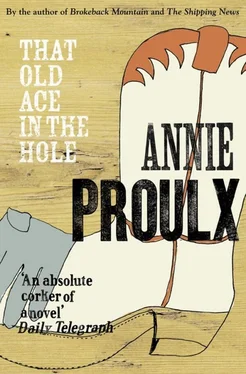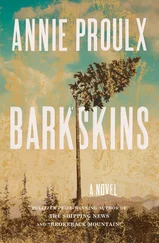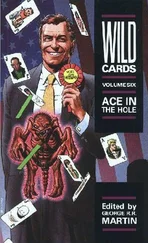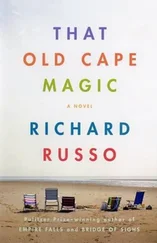The post office was two streets back, a false-front building shaded by a small Cottonwood tree. On slat-backed benches sat four elderly men, leathery, wrinkled, skinny-necked and thin, all with their right legs crossed over the left. Their pants legs rode high exposing four white shanks in oblique alignment. They all smoked cigarettes showing the same length of ash, they turned their heads in unison to watch the traffic pass. Bob Dollar was pleased to see so many oldsters and imagined them all to be proprietors of big spreads.
Another elderly man standing outside the post office, wearing chinks, cowboy hat and tooled leather cuffs, gave him directions to the Busted Star, said it was owned by LaVon Grace Fronk, told him to stay on the asphalt because they’d just bush-hogged the damn roadsides, now bristling with brush stobs sharp as punji sticks. He mounted a grey horse, saluted Bob Dollar and rode off. The horse limped.
“Come on in,” yodeled the woman, beckoning him into the gloom of the house. Her voice was grainy and oleaginous at the same time, like coarse-ground peanut butter. “Will you all take a glass of water or some Pepsi?” LaVon Fronk, small and thin as a fifth-grader, was a middle-aged ranch widow who resembled one of the minor Roman emperors with her intense, nervous face, small mouth barely wider than her nose, the eyes close-set under a ledgey brow, marbled hair of faded red and white.
“I’d love some water,” he said, his throat parched with dust. She made a little production of getting the glass, rinsing it, putting in ice cubes, taking a pitcher of iced water from the refrigerator, slicing a lemon and perching it on the rim of the glass. The house seemed very hot to him.
“There! There’s nothing like cold water, is there? I was a Harshberger from Miami” – she pronounced it “Miama” – “Miami, Texas, of course. Not the Florida place. I married Jase Fronk in 1951 and he died – well, that’s enough of that.”
“Woolybucket is kind of a strange name,” said Bob. “Is it called after somebody?”
“Named after the woolybucket tree. I guess there used a be a lot a them grew here. Birds like a woolybucket. The leaves in the spring, why they are all fuzzy underneath before they roll out – that’s the wooly buckets. And Cowboy Rose is named after a flar. The wine cup. That’s the other name for the cowboy rose. You couldn’t have a town called ‘Wine Cup.’ Not in teetotal Woolybucket County.”
While he drank his water Bob noticed flamboyant knickknackery everywhere. LaVon said the kitchen was French provincial, though to him it seemed Texas provincial, a clean white linoleum floor, a white Formica table with chrome legs and matching chairs, a calendar on the wall next to a portrait of Jesus constructed of macaroni and seeds, and against the walls aged and noisy white appliances. The dishtowels, stamped Bonjour at the bottom, showed the Eiffel Tower. On the counter stood ceramic jars labeled CAFÉ, SUCRE, FARINE. A poster reproduction of Brassaï’s Steps of Montmartre hung over a wine rack, which contained not wine but bottles of whiskey; a good sign, thought Bob Dollar. She showed him dozens of items she had purchased through mail-order catalogs – a leather hot water bottle cover, a Moroccan oil lamp. Over the cat’s basket – she had a heavy paint tomcat with a bad leg, only one ear and half a tail, the victim of an encounter with the lawn mower – a blue enamel sign declared CHAT LUNATIQUE. Chat mort would have been more accurate, for the somnolent beast lay as one dead hour after hour, rousing only when the refrigerator door opened or when the gangly neighbor boy started the lawn mower.
When he finished his water she said, “Well, let’s go have a look at that bunkhouse.”
“This’s it,” she said, driving him through a bumpy pasture, over a sullen creek toward a motte of cottonwood trees. There was a second fence behind the barbwire made up of old tires on end, packed three deep in overlapping rows. Under the cottonwoods stood a small log building with a porch. A rope ran around the circumference of the porch floor and La Von explained this was to keep snakes out of the cabin. Inside were four empty bunks, on each a thin mattress folded in half, a stack of blankets, four wooden chairs at a square table. There was a tiny stove with a blackened teakettle on it and against the wall a wood box full of kindling and sticks.
“Spartan,” she said. “There’s no electric. Supply your own sheets and towels. You’ll have to haul water. Get it down the house in the kitchen.”
“I’ll take it,” he said without seriously considering a daily drive across a cow pasture, the labor of lugging water, no telephone, for already he was taking pleasure in the subtle beauty of the panhandle, noting the groves and thickets along watercourses, huge coils of grapevine weaving the trees into a coarse fabric. He thought the bold diagonal of caprock rim that divided the high plains from the southern plains, the red canyons of the Palo Duro striking and exotic.
He unloaded his suitcase, his new briefcase (new only to him, for it had come from Uncle Tam’s shop) with its freight of Global Pork Rind flyers and papers, a pair of pinch-toe cowboy boots shining with polish, and the box of fried chicken he had brought from Perryton. It took only a few minutes to unpack. He went outside and walked around the bunkhouse, starting up a plump, chickenlike bird in the tangled vines along the creek. The sound of running water was pleasant though it made him want to piss. Against the back of the bunkhouse leaned four large logs, two of them partially shaped and carved into figures – a woman’s head with flowing hair, and a roughed-out human figure that vaguely resembled Lenin. Perhaps some ranch hand had fancied himself a sculptor.
In the deepening afternoon he sat on the porch with a warm bottle of Pearl and told himself to buy a cooler and ice in Woolybucket the next day. There were several pieces of farm machinery in a large field to the west, ungrazed for some years and grown up with big bluestem and weeds. He counted five rusted wheat combines, three pickup trucks, four old tractors, various harrows and rakes, all sinking into the earth. There was a dark shape in the high grass, but what it was he could not make out – perhaps an old gas pump. In the dulling light he noticed a low rise to the south, too low to be called a hill even in this flat country, little more than a swelling as though the earth had inhaled and held the breath. But by panhandle standards it was a wave of earth that deserved the name “hill.” Beyond the rise was a great indigo cloud spread open like a pair of dark wings, monstrous and smothering, shot through with ribbands of lightning, and in the distance the stuttering flash of strobe lights at the ends of the irrigation pivot water arms. The dusk sifted down like molecules of pulverized grey silk.
He left the fried chicken skin and bones on the porch floor. Sometime in the night he woke to hoarse barking cries outside the door repeated with monotonous regularity. But even as he struggled to come fully awake the barks began to recede and, peering out the window into faint starlight, all he could see was a small shadow gliding into the black weeds, whether fox or coyote he didn’t know. Toward morning rain tapped the roof.
He went over to the ranch house in the morning, drew the water, then sat and had a cup of coffee with La Von, who had the regional taste for very weak, pale brown coffee. She told him she was compiling a county history which she called The Woolybucket Rural Compendium , hundreds of memoirs and photographs from families of the region.
“Mr. Dollar, I have been workin at it for thirteen years.”
Her mailboxes, she said, were packed full with genealogical reminiscence every noon when Doll McJunkin delivered. Elderly visitors came up the drive with their boxes of photographs and diaries, faded envelopes. The papers and photographs filled two entire rooms downstairs. As they sat at her worktable with their coffee cups LaVon gestured at the shelves of boxes.
Читать дальше












